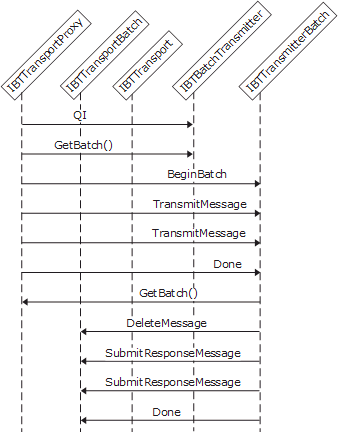Interfaces for a Solicit-Response Send Adapter
Send adapters use the same batch mechanism as receive adapters to submit response messages back into the server.
Note
It is recommended that a solicit-response adapter is process messages asynchronously. If the adapter processes message in a synchronous manner, there is a risk of message duplication.
Send adapters need to implement the following interfaces to work in solicit-response mode:
IBTTransport
IBaseComponent
IBTTransportControl
IPersistPropertyBag
IBTTransmitter
IBTTransmitterBatch and IBTBatchTransmitter (if send batching is required)
IBTBatchCallBack
The steps involved in the object interaction are as follows:
After the adapter sends a solicit message, it receives back a response message from that destination server. It then obtains a batch from the transport proxy.
The adapter adds the response message to the batch by calling IBTTransportProxy::SubmitResponseMessage.
The adapter submits the batch by calling IBTTransportProxy::Done passing in a pointer to its IBTBatchComplete interface for the callback from the Messaging Engine.
The Messaging Engine calls the adapter's IBTBatchCallBack::BatchComplete callback method using the transport proxy notifying it of the result of submission operation.
The following figure shows the object interactions involved in creating a solicit-response send adapter.

Interaction diagram for a solicit-response send adapter
See Also
Adapter Variables
Developing a Send Adapter
Instantiating and Initializing a Send Adapter
Interfaces for a Synchronous Send Adapter
Interfaces for an Asynchronous Send Adapter
Interfaces for a Synchronous Batch-Supported Send Adapter
Interfaces for an Asynchronous Batch-Supported Send Adapter
Interfaces for a Transactional Asynchronous Batch-Supported Send Adapter